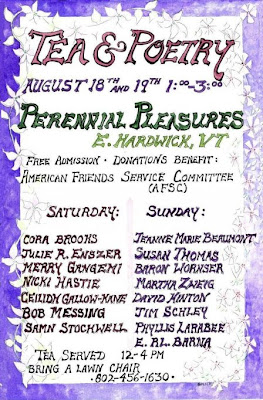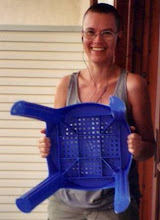What might that look like? I can think of a few things. But if I have to start somewhere, then An L of a Night at Nottingham Playhouse paints a satisying image. That's where I spent an enjoyable evening last night, along with my partner and 708 other lesbians! Can you imagine that many lesbians in one room?
Quite what we were all doing there is worth analysis. As host of the evening,
Belinda O'Hooley, quipped: "Why would any lesbian want to go out now that
The L Word is available on DVD?"
Oh, but it seems that if we are offered our own particular brand of L-entertainment then we will turn out in our hundreds! The event was sold out weeks in advance. L-entertainment. Lentertainment. I like that. I'm sure others have used that word before, but I'll pretend it's a new L Word made up by me just now. I'm not religious, so the peculiarities of Lent tend to go over my head, but I'm pretty sure none of us would choose to give up our lesbians. Not me.
Greymatter opened the evening. They really are very special as a live act, and I enjoy The Indigo Girls influences. Plenty of other influences, too. Em and George as lead vocalists know how to connect with an audience. They have an easy charisma, and it's clear there's a great rapport between them. I'm hoping Greymatter will take up an invitation to be interviewed on
Woman-Stirred Radio. Greymatter also played their pre-show publicity well, encouraging their fans to wear the newly-available Greymatter t-shirts. Here's a band that's going places.
Next up was
Clare Summerskill with her original songs and comedy dissecting the quirkiness and tribulations of lesbian relationships in a way this audience could definitely relate to. Get us together in a large enough group and we're good at laughing at ourselves. I enjoyed the jokes about wondering what to wear and Clare's comment about it being so much easier if only there was a lesbian clothes shop on every high street. The punchline: "Oh, there is one! We've got Millets."
The interval came, and it's not easy being among that many women when you need to join the toilet queue. Actually, it was entirely civilised and fairly fast-moving - does the average dyke spend less time in a toilet cubicle than other women? It depends what we're doing in there, I suppose. But you do have to wonder if someone can't invent a new system for toileting that takes us more quickly through the relevant stages while still allowing for the highest standards of hygiene and privacy.
Back on stage with
Al Start, whom I have to admit I hadn't heard sing before and had mostly overlooked when she was featured in Diva Magazine. She has an engaging image and laid-back stage presence, and my partner Andrea commented to me that she has a look of Matthew Perry from his early
Friends days. She does as well. I'd call this cute. Al Start writes tender, rocky songs about her 1970s childhood and personal experiences, and she calls her guitar Mabel. I'm a sucker for women who develop friendships with instruments and objects.
Sue Perkins had top billing. I bet she had her suit, including waistcoat, tailored especially for her. I'm busy looking for a new waistcoat at the moment. Sue Perkins was presented with a comedy gift in the person of Mary, the British Sign Language signer. Sue was never in any danger of being upstaged - she's a consummate professional and performer, making best use of the moment, including audience participation (and lack of it) - but Mary was a total star. Signing some very choice language created hilarious moments, including "verruca" (an audience contribution), "bollocks", "ladynuts" and "special needs mule", which caused confusion when Mary heard this as "special needs meal"! Sue Perkins in live stand-up must be seen.
It was a real shame when one audience member almost spoilt the tone of the whole night, right at the end of Sue's slot, by questioning how often comedians update their material and why it would be worth paying to see a comedian in stand-up regularly. Trust an audience of lesbians to make it a controversial night. As Sue had commented earlier after a joke about the Pope (she's allowed to, she was brought up Catholic), the only murmurs of protest she's ever received doing this routine were from
this lesbian audience. Can you believe it? Unfortunately, I can. But you can also rely on an auditorium of lesbians to back up a star performer against a voice of dissent when they believe that voice is wrong. Sue Perkins showed her balls alright, and she got a standing ovation. I hope she doesn't go away cursing the Nottingham audience.
Go and see Sue Perkins in stand-up. There was some wonderful material on Ruth Kelly. Listen to her radio shows. Belinda O'Hooley, very funnily, couldn't remember what those shows are when doing her introduction, but you can see them at Sue's wikipedia entry.
A Night of Lesbian Entertainment should involve supporting our out lesbian performers, if and when we can afford to. I know ticket prices for live performance will always be an issue that excludes some women. We need music, humour, voices and affirmation to enrich our lives. We deserve that.
Why is it we have so few recognised names to invite onto the bill for future
L of a Night events? Today, I found this
reference to the fact that Sue Perkins' "earnings plummeted 65 per cent in the year after she came out as a lesbian". Makes you think, doesn't it?
Labels: comedy, LGBTQ culture, music




 In that same week in April 1988, I was instigating my personal protest and plan to escape from university halls of residence, due to homophobic harrassment from other students. I already knew the climate of Clause 28 was doing me no favours.
In that same week in April 1988, I was instigating my personal protest and plan to escape from university halls of residence, due to homophobic harrassment from other students. I already knew the climate of Clause 28 was doing me no favours.


